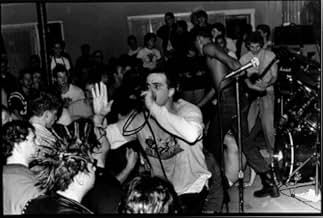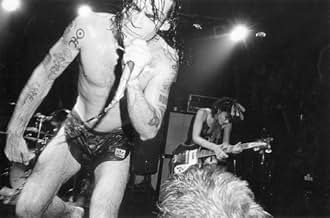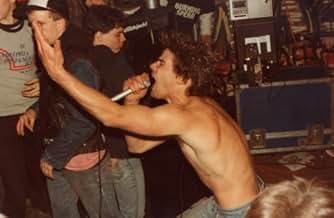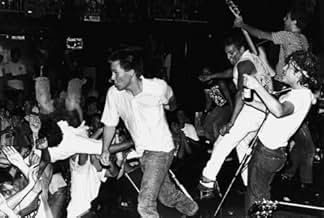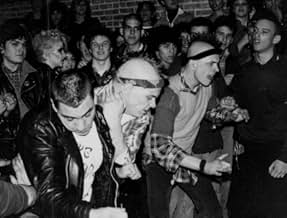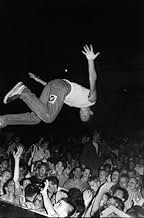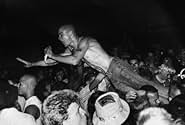VALUTAZIONE IMDb
7,3/10
3685
LA TUA VALUTAZIONE
Aggiungi una trama nella tua linguaThe History of American Punk Rock 1980-1986The History of American Punk Rock 1980-1986The History of American Punk Rock 1980-1986
James Drescher
- Self
- (as Jimmy Gestapo)
Joe Keithley
- Self
- (as Joey 'Shithead' Keithley)
David Markey
- Self
- (as Dave Markey)
Recensioni in evidenza
Nice and nostalgic for those who were there.
Potentially misleading and perhaps too long for those who were not there and don't get the nostalgia.
My comments are more of a reaction than a review.
I won't pretend to be objective. I lived through this and experienced it differently from the 'leading lights' who were interviewed in the film. I met and even hung out with a few of the folks in the film over the three years (1980-1982) when I was in and out of NYC and Philly scenes. Of course, hardcore had not yet been commercialized at this time and none of them were regarded as legends. It's great to see that most of them are still true believers and haven't developed regrets, but it's really odd that they are still saying exactly the same things about HC that they were saying twenty years ago. Isn't hindsight supposed to be 20/20 or something? Well... really... it's all a matter of perspective, and that's the point of this review.
From 1979 to 1984 I was a member of a band which crossed over from punk to hardcore in 1980. I began with them at the age of 14 and stuck around until, as Ian Mackaye put it, "hardcore checked out". Being part of the NJ/NYC punk community, and having grown up in a small rural town in central Jersey, my perspective on the whole business is a bit different.... But, again... that's the point, isn't it?
From my point of view, the film has one major flaw - Most of the interviews seem to have developed out of a set of basic misconceptions: (1) that hardcore was about something in particular, (2) that the leaders of the most popular hardcore bands were somehow experts in what hardcore was and (3) that the portion of the country where hardcore got the most early media attention was somehow more important than the rest of the world.
I was never a big fan of hardcore's regionalism (which was a big deal in the scenes I was involved with) and was interested mainly in bands which were original, energetic and fun regardless of where they came from. Sadly, the east coast frequently exhibited symptoms of an inferiority complex because of the commercial and media attention California got - a couple of examples are the titles of early eastern Punk and HC compilations:
Philadelphia: Get Off Our Backs We're Doing it Too. NYC: New York Thrash and The Big Apple Rotten to the Core Boston: This is Boston, Not L.A.
Telling, ain't it?
Because of my own experiences, the interviews of NYC, Washington DC and Boston band members resonated more strongly with me than the California-centered stuff. Don't get me wrong, I loved the DKs, Black Flag, the CJs, Fear, X, UXA, The Avengers, and many other West-coasters, but I still reject the adoption of the archetype American Punk lifestyle which was drawn out of stereotypes imported by the mass media from California.
From my perspective, punk was truly anti-conformist, and CoC's comments about the fascist anti-fascism that became a major component of HC late in it's life were dead-on accurate. It's as if a whole bunch of fools turned on Quincy, saw an inaccurate representation of slam dancing based on things that were happening in particular parts of Southern California (where Quincy was filmed) and all-of-a-sudden decided to get mohawks and leather jackets and go beat up people at shows.
Maybe New York police have bigger and better things to do, but I do not remember a single of the 100s of shows I went to or played which were ever even threatened with a shut-down, let alone attracting the attention of more than a few squad cars. And honestly, I don't remember any NYC or Philly cops doing anything much worse than shaking their heads and rolling their eyes during these incidents. Maybe NYC punks were radically different from Calpunks, because I knew very few people in HC and/or punk who would ever espouse hating any group of people in a broad-brush manner such as police and hippies.
For me and most of my friends HC was a chance to have fun, get up on stage and play, help other people have fun, and to express ourselves socially and politically with an audience which could relate and appreciated pretty much whatever you threw at them. Most of the messages were against violence, against stereotyping, against injustice, and even against drugs. And the bands all supported each other, whether or not they agreed about politics, music or whatever. Really nice. Sure the dancing got kind of rough at times, but it only got really bad after that fateful episode of Quincy.
This is a good film. I was very excited to see the respect with which the Bad Brains were treated and the range of excellent bands chosen for the interviews. The film is really just a lengthy series of edited monologues and dialogs from interviews conducted by the director. The cinematography is straightforward and really nothing special - fine for what was intended. There are relatively few musical interludes (mostly poorly filmed cam-jobs), and no complete songs.
The film serves well as a memoir for old punks like myself, and a good introduction to the major tropes and official mythology of the hardcore movement for those of later generations. Don't mistake the generalizing opinions of the interviewees (or mine for that matter) to be representative of anything besides the individual opinions that they are, however. And remember always - no matter what anybody says about hardcore, Gang Green summed it all up better than anybody in their song "Have Fun"
We just wanna have some fun
We just wanna have some fun
While we're young enough
To get away with it.
!
Potentially misleading and perhaps too long for those who were not there and don't get the nostalgia.
My comments are more of a reaction than a review.
I won't pretend to be objective. I lived through this and experienced it differently from the 'leading lights' who were interviewed in the film. I met and even hung out with a few of the folks in the film over the three years (1980-1982) when I was in and out of NYC and Philly scenes. Of course, hardcore had not yet been commercialized at this time and none of them were regarded as legends. It's great to see that most of them are still true believers and haven't developed regrets, but it's really odd that they are still saying exactly the same things about HC that they were saying twenty years ago. Isn't hindsight supposed to be 20/20 or something? Well... really... it's all a matter of perspective, and that's the point of this review.
From 1979 to 1984 I was a member of a band which crossed over from punk to hardcore in 1980. I began with them at the age of 14 and stuck around until, as Ian Mackaye put it, "hardcore checked out". Being part of the NJ/NYC punk community, and having grown up in a small rural town in central Jersey, my perspective on the whole business is a bit different.... But, again... that's the point, isn't it?
From my point of view, the film has one major flaw - Most of the interviews seem to have developed out of a set of basic misconceptions: (1) that hardcore was about something in particular, (2) that the leaders of the most popular hardcore bands were somehow experts in what hardcore was and (3) that the portion of the country where hardcore got the most early media attention was somehow more important than the rest of the world.
I was never a big fan of hardcore's regionalism (which was a big deal in the scenes I was involved with) and was interested mainly in bands which were original, energetic and fun regardless of where they came from. Sadly, the east coast frequently exhibited symptoms of an inferiority complex because of the commercial and media attention California got - a couple of examples are the titles of early eastern Punk and HC compilations:
Philadelphia: Get Off Our Backs We're Doing it Too. NYC: New York Thrash and The Big Apple Rotten to the Core Boston: This is Boston, Not L.A.
Telling, ain't it?
Because of my own experiences, the interviews of NYC, Washington DC and Boston band members resonated more strongly with me than the California-centered stuff. Don't get me wrong, I loved the DKs, Black Flag, the CJs, Fear, X, UXA, The Avengers, and many other West-coasters, but I still reject the adoption of the archetype American Punk lifestyle which was drawn out of stereotypes imported by the mass media from California.
From my perspective, punk was truly anti-conformist, and CoC's comments about the fascist anti-fascism that became a major component of HC late in it's life were dead-on accurate. It's as if a whole bunch of fools turned on Quincy, saw an inaccurate representation of slam dancing based on things that were happening in particular parts of Southern California (where Quincy was filmed) and all-of-a-sudden decided to get mohawks and leather jackets and go beat up people at shows.
Maybe New York police have bigger and better things to do, but I do not remember a single of the 100s of shows I went to or played which were ever even threatened with a shut-down, let alone attracting the attention of more than a few squad cars. And honestly, I don't remember any NYC or Philly cops doing anything much worse than shaking their heads and rolling their eyes during these incidents. Maybe NYC punks were radically different from Calpunks, because I knew very few people in HC and/or punk who would ever espouse hating any group of people in a broad-brush manner such as police and hippies.
For me and most of my friends HC was a chance to have fun, get up on stage and play, help other people have fun, and to express ourselves socially and politically with an audience which could relate and appreciated pretty much whatever you threw at them. Most of the messages were against violence, against stereotyping, against injustice, and even against drugs. And the bands all supported each other, whether or not they agreed about politics, music or whatever. Really nice. Sure the dancing got kind of rough at times, but it only got really bad after that fateful episode of Quincy.
This is a good film. I was very excited to see the respect with which the Bad Brains were treated and the range of excellent bands chosen for the interviews. The film is really just a lengthy series of edited monologues and dialogs from interviews conducted by the director. The cinematography is straightforward and really nothing special - fine for what was intended. There are relatively few musical interludes (mostly poorly filmed cam-jobs), and no complete songs.
The film serves well as a memoir for old punks like myself, and a good introduction to the major tropes and official mythology of the hardcore movement for those of later generations. Don't mistake the generalizing opinions of the interviewees (or mine for that matter) to be representative of anything besides the individual opinions that they are, however. And remember always - no matter what anybody says about hardcore, Gang Green summed it all up better than anybody in their song "Have Fun"
We just wanna have some fun
We just wanna have some fun
While we're young enough
To get away with it.
!
I remember reading a review of American Hardcore in one of the weeklies in Portland. It stated something to the extent that if you know hardcore, you will not learn anything and if you know nothing about hardcore, you won't learn much. I can't agree more.
As someone that has a fair amount of knowledge of the history of the American Hardcore movement, I don't feel like I learned much new about hardcore. And, I have talked to others that know little about hardcore and they had a hard time tracking.
I was also surprised about some of the things that were missing. How could Maximum Rock n' Roll be left out? Maybe the Dead Kennedys were left out because of all the legal stuff going on with them now or maybe because a lot of old punks don't like them now. I know there is only so much room and info someone can squeeze into two hours, but it is hard to see how certain things were left out of it.
I think it was a good attempt. The director should have made a better decision and either make it a movie for someone that knew nothing or a movie for the more advanced viewer. Still, if you are a fan of hardcore or you are perhaps a younger viewer that has some interest in the hardcore punk movement of the early 80's, it is worth renting.
As someone that has a fair amount of knowledge of the history of the American Hardcore movement, I don't feel like I learned much new about hardcore. And, I have talked to others that know little about hardcore and they had a hard time tracking.
I was also surprised about some of the things that were missing. How could Maximum Rock n' Roll be left out? Maybe the Dead Kennedys were left out because of all the legal stuff going on with them now or maybe because a lot of old punks don't like them now. I know there is only so much room and info someone can squeeze into two hours, but it is hard to see how certain things were left out of it.
I think it was a good attempt. The director should have made a better decision and either make it a movie for someone that knew nothing or a movie for the more advanced viewer. Still, if you are a fan of hardcore or you are perhaps a younger viewer that has some interest in the hardcore punk movement of the early 80's, it is worth renting.
This film puts you on the stage with (almost) all the protagonists of the scene. Now, I saw the efforts in the production: many interviews, many concerts, however, in the end, I cannot hide that it's remained in me a feeling of disappointment. There are many, too many bands ignored in this documentary that, according to its presentation, should talk about history of hardcore in the USA. Well, for example, I haven't heard of the Dead Kennedys even once. This is only one of the many absences (for me, the worst) that have petrified me. It's a good film and everyone who like this musical genre should watch it in my opinion, but what a pity.
Just came out of a preview screening of this fine film here at the Natfilm festival in Copenhagen, Denmark! In short, 'American Hardcore' lives up to the expectations: Made in a D.I.Y. fashion befitting its' subject, it gives you an excellent overview of the first wave of American hardcore music, nicely balancing the violence that characterized the early days with the positive message that came out of it.
You'll get to see lots and lots of never-seen-before amateur footage from (really) early hardcore shows, interwoven with many, many, many excellent interviews with key figures from the scene.
Fact is, the filmmakers have managed to dig up pretty much everybody who was a nobody back in the day: Where one could have expected a long line of New York art critics, psychologists, social anthropologists and the like yakitiyaking away about form and substance, with perhaps a single Henry Rollins getting to represent the "hardcore punk subculture" as a whole, instead what you get is a literal who's-who of early American hardcore: You've got your Gang Green and your Circle Jerks, your SS Decontrol and your Jerry's Kids, your Negative F/X and your Cro-Mags, and so on and so forth.
On a side-note, some personal favorites will inevitably be missing from any such line-up -- yours truly specially misses Choke from Slapshot, Billy Milano from S.O.D., and Paul Bearer from Sheer Terror -- but that goes with the territory.
A bigger fault, perhaps, lies in the radically negative view one gets of what happened next. Towards the end of the film you're bombarded with clip after clip of hardcore veterans telling you that after '86, it was all over. Granted, what happened next falls outside of the framework of this movie (it specifically deals only with the years 1980-1986) and to make it sound like if it all actually ended in '86 makes for good drama -- but of course in fact it just isn't true.
In '88 you had the Gorilla Biscuits, Youth Of Today, Bold, Judge, and so on and so forth, and during the 90's, well, the thing kinda went on and on, evolving or degenerating depending on how you see things. In the eyes of purists perhaps what came after '86 doesn't count -- but if so, it would have been nice to hear something said about it, to hear these guys explain what it is about, say, Integrity or Floorpunch or Catharsis or His Hero Is Gone or Good Clean Fun that makes them so decidedly un-hardcore.
But why whine about such wee little things? All in all, the film is an excellent piece of documentary about the finest underground movement in music anywhere in the world between Roky Erickson came out of the asylum in the 70's and the churches burned in Norway in the 90's!
You'll get to see lots and lots of never-seen-before amateur footage from (really) early hardcore shows, interwoven with many, many, many excellent interviews with key figures from the scene.
Fact is, the filmmakers have managed to dig up pretty much everybody who was a nobody back in the day: Where one could have expected a long line of New York art critics, psychologists, social anthropologists and the like yakitiyaking away about form and substance, with perhaps a single Henry Rollins getting to represent the "hardcore punk subculture" as a whole, instead what you get is a literal who's-who of early American hardcore: You've got your Gang Green and your Circle Jerks, your SS Decontrol and your Jerry's Kids, your Negative F/X and your Cro-Mags, and so on and so forth.
On a side-note, some personal favorites will inevitably be missing from any such line-up -- yours truly specially misses Choke from Slapshot, Billy Milano from S.O.D., and Paul Bearer from Sheer Terror -- but that goes with the territory.
A bigger fault, perhaps, lies in the radically negative view one gets of what happened next. Towards the end of the film you're bombarded with clip after clip of hardcore veterans telling you that after '86, it was all over. Granted, what happened next falls outside of the framework of this movie (it specifically deals only with the years 1980-1986) and to make it sound like if it all actually ended in '86 makes for good drama -- but of course in fact it just isn't true.
In '88 you had the Gorilla Biscuits, Youth Of Today, Bold, Judge, and so on and so forth, and during the 90's, well, the thing kinda went on and on, evolving or degenerating depending on how you see things. In the eyes of purists perhaps what came after '86 doesn't count -- but if so, it would have been nice to hear something said about it, to hear these guys explain what it is about, say, Integrity or Floorpunch or Catharsis or His Hero Is Gone or Good Clean Fun that makes them so decidedly un-hardcore.
But why whine about such wee little things? All in all, the film is an excellent piece of documentary about the finest underground movement in music anywhere in the world between Roky Erickson came out of the asylum in the 70's and the churches burned in Norway in the 90's!
Fans of this short window in time of musical history will surely enjoy it for its nostalgic merit alone. The footage is raw and accurately depicts the dingy and often violent world of Post "Germs, Sex Pistols" and Pre-metal years of hardcore. Many important bands of that era were not depicted in the film for various legal reasons IE: The Dead Kennedy's, and The Misfits, but the variety of bands presented is a noble effort. Surprising to me was what I considered a LACK of music in the film, as most of it came in the form of the final ten seconds of a songs performance, then cutting into the next scene. The film IS about music so it's not like there isn't any, however I would have enjoyed more extended live footage. My harshest criticism of the film is that it simply shrinks away as to the real explanation of how this movement really came to an end. While it glorifies many great bands that created some extremely potent and visceral music, it ultimately brushed aside why the hardcore scene seemed to sputter and almost vanish. The film near its summation briefly touches upon the influence of heavy metal and how some bands evolved into that new sound. They seem to suggest that the "atmosphere" had changed but in reality the bands changed. Kids showed up a year later and all their favorite bands had grown long hair and seemed to be interested little in their hardcore roots. Sad but true.. but this was a genre praised for its dedication to "Doing It Yourself" but in the end they chose to find a way to pay the bills instead. I have never faulted bands for deciding they wanted to eat more than a package of Dorrito's in the back of a tour van, and I do not view metal as a lesser form of art, but the fact remains that the bands create the music, which in turn produces an environment. I was all too happy to indulge in the personal trip down memory lane, but I would have liked a more probing response as to its demise. I have to review this film positively because I am biased as to the musical content and to the time in which it represents, but to omit that money and industry influence is what truly ruined this scene,(As in most others due to over exposure, parody and more seemingly lucrative musical paths) is a strange and unsatisfying oversight. Having just praised its unyielding, anti-conformist roots I was then expected to forget it ever happened. As I stated all in all it's an absorbing film and a greatly accurate depiction of a highly influential point in the musical landscape. It should be viewed if for no other reason than its tribute to the contribution that American Hardcore had to musical history.
Lo sapevi?
- QuizDespite this movie talking about how Reagan's presidency gave inspiration to the whole hardcore punk scene, New York Hardcore Punk band Reagan Youth is nowhere to be heard in this documentary.
- ConnessioniFeatures Urban Struggle: The Battle of the Cuckoo's Nest (2008)
- Colonne sonorePay to Cum
Written by H.R. (as P. Hudson), Gary 'Dr. Know' Miller (as G. Miller),
Darryl Jenifer (as D. Jenifer), Earl Hudson (as E. Hudson)
Performed by Bad Brains
Caroline/EMI Records
© Bad Brains Publishing (ASCAP) 1979
Used by Permission
I più visti
Accedi per valutare e creare un elenco di titoli salvati per ottenere consigli personalizzati
- How long is American Hardcore?Powered by Alexa
Dettagli
- Data di uscita
- Paese di origine
- Sito ufficiale
- Lingua
- Celebre anche come
- American Hardcore: The History of American Punk Rock 1980 - 1986
- Luoghi delle riprese
- Aziende produttrici
- Vedi altri crediti dell’azienda su IMDbPro
Botteghino
- Lordo Stati Uniti e Canada
- 279.665 USD
- Fine settimana di apertura Stati Uniti e Canada
- 18.102 USD
- 24 set 2006
- Lordo in tutto il mondo
- 376.057 USD
- Tempo di esecuzione1 ora 40 minuti
- Colore
- Mix di suoni
- Proporzioni
- 1.85 : 1
Contribuisci a questa pagina
Suggerisci una modifica o aggiungi i contenuti mancanti

Divario superiore
By what name was American Hardcore (2006) officially released in India in English?
Rispondi

